There isn’t normally much going on in Oak Bluffs on a January night.
But there normally is something going on.
At the Ritz — a mainstay, year-round dive bar on Circuit avenue — Johnny Hoy and his harmonica blues will take the stage twice a week, Johnny Showtime and his trivia nights sandwiched in between. The Cardboard Box is like an off-season club. And even though almost all the other seasonal bars are closed, a few smokers always linger outside, parking spaces can still be tough to find on the lower avenue, and the karaoke machine carries Islanders through the deepest, darkest moments of the winter.
But this year, with the Covid-19 pandemic raging, the normally quiet down-Island Main streets have turned ghostly, as the off-season tests the Vineyard winter economy and social fabric and in a way it has never been tested before.
And it’s not yet February.
“We’re going to be eating beans and rice for a year, but we’ll be fine,” said The Ritz owner Larkin Stallings, who made the decision to close the bar and restaurant on New Years’ Day.
Along with The Ritz, anchor, year-round restaurants and bars in all three down-Island commercial hubs have shuttered early, hibernating in an attempt to outlast the frigid economic climate. The Black Dog Tavern in Vineyard Haven — long a classic, cozy off-season spot on the waterfront — closed early and plans to open late. The Newes From America pub in Edgartown did the same, the raging fire and timber tables locked up until the April thaw.
In a letter to Edgartown selectmen requesting the closure, Kelley House general manager Evan Bailey was clear about the reason.
“The decision is in response to the impact the global pandemic has taken on our industry,” Mr. Bailey wrote.
In interviews with more than a dozen normally year-round Main street Island businesses, owners and managers said that the summer of survival transitioned right into the winter of simply surviving, with businesses hoping to outlast a pandemic that has seemingly caught up to everyone. The businesses that have survived, in some cases, said they have done well, reporting better winters than past years. But the impacts — and pressures — of the pandemic remain severe for all.
Restaurants and some retailers, particularly hard hit, have been faced with early closures, reduced hours or structural changes. For Islanders, that has meant “for rent” or “takeout” signs in windows where jewelry and menus used to hang, fewer options on Main streets, and a bleak reminder of Island winters long thought to be figments of the past, when the post office and grocery store were the only year-round establishments.
Christine Flynn, the economic development planner at the Martha’s Vineyard Commission, put it succinctly.
“It can be devastating to a downtown when doors are closed,” Ms. Flynn said.
In Oak Bluffs and Edgartown, the closures extend beyond The Ritz and The Newes. Rosewater Market, which recently reopened, had been closed for more than nine months, while the Harbor View Hotel shortened its hours and Isola shut down earlier in the year. The Oak Bluffs Mocha Mott’s location has been closed since the winter settled in; ditto for The Loft and MV Chowder Co. Other year-round restaurants, like Offshore Ale and the Cardboard Box, are only open for takeout or outdoor dining. In Vineyard Haven, EduComp and Mosher Photo, two historic Main street businesses, closed permanently.
Mr. Stallings normally closes The Ritz for a few weeks in February, and reopens in early March. This year, he closed on New Year’s Day.
“The fall and late winter were pretty rough. Our staff was basically able to find better employment in Florida so they’ve gone to Florida for the winter,” he said. “The money in what we do, really kind of dried up.”
Other restaurants cited difficulties in finding staff, especially as the summer and fall ended and seasonal work forces left the Island. Many said statewide limitations on indoor dining during the winter months were particularly restrictive, leaving little room for already thin offseason profit margins.
“In addition to the pandemic and reductions in business levels, the recent mandate by Gov. Charlie Baker reducing in-dining occupancy to 25 per cent makes it impossible to cover our operating costs,” Mr. Bailey wrote in his letter to the Edgartown selectmen.
While outdoor dining and creative streetscape changes in all down-Island towns gave restaurants and retailers more options during the summer, less could be done to help the businesses as temperatures dropped.
Those restaurants that have survived — or even thrived — are the ones that have been able to successfully transition themselves to takeout and grab-and-go formats, like the Copper Wok in Vineyard Haven and Vineyard Caribbean Cuisine in Oak Bluffs.
“If you’re a heavily takeout business, you’re having a great year. If you’re a bar or a sit-down restaurant, you’re struggling, but you’re adapting,” said J.B. Blau, the Island restaurauter who owns Copper Wok, Sharky’s Cantina and MV Chowder Company.
At Copper Wok, Mr. Blau said he has stayed afloat despite significant revenue deficits, largely thanks to his takeout business and a small dining area running at 25 per cent of usual capacity. He said his more upscale restaurants, like the Chowder Company in Oak Bluffs, have been dark since early in the pandemic. Sea Smoke barbecue closed in December.
Newton Waite, who owns Vineyard Caribbean Cuisine in Oak Bluffs, counted his blessings.
“We would say for winter, we’re not doing too bad,” said Mr. Waite. “It’s a different winter.”
Richard Leonard, Cape Cod Five bank’s regional president for Martha’s Vineyard, said that the already tough summer made for an even tougher off-season. “The impact has been especially hard on the hospitality businesses and their employees,” Mr. Leonard said. “We’re in the off-season, and a lot of these smaller businesses have slower cash flow. The difference this year is that they are entering the off-season from such a tough place.”
Ms. Flynn at the MVC added that the challenges from Covid-19 would likely reverberate for a long time.
“Many businesses may not survive,” she said.
But not all is dark and dreary. In Vineyard Haven, the Island’s most traditional year-round town, Main street retailers and restaurants that are still open said they are operating through a quiet, but stable winter.
“I think people really forget how year-round Vineyard Haven really is,” said Sara York, manager at C.B. Stark Jewelers and head of the Vineyard Haven business association. “Not much changed.” Ms. York said traffic at the jewelry shop this January has actually surpassed that of last year.
Elaine Barse, owner of the Green Room, a clothing and outdoor goods store, said her retail season has been very similar to that of previous years, if not slightly better. New businesses, like a sporting goods store called Sideline, have opened on Main street, and year-round spots like Waterside Market and Mikado have settled in to takeout.
Island bankers also noted that a second round of Payroll Protection Program loans has just begun, focused more heavily on the restaurant and hospitality industry. The loans will cover three months of payroll, rather than the two months covered last cycle, and require businesses to show a 25 per cent decline in revenues, gearing them toward the Island’s hardest hit industries. Three hundred businesses have already applied through MV Bank, president James Anthony said.
Mr. Anthony also said that robust testing programs in Island schools, funded by MV Youth and other charitable grants, have allowed parents to return to work, thereby helping to buoy the economy — and allowing eateries like Rosewater to reopen.
But unemployment numbers in Dukes County remain bleak this winter. In November the Island had the second-highest unemployment rate in the state, at 7.2 per cent, according to a recent housing needs assessment done by the Martha’s Vineyard Commission.
The impact extends beyond the economy. After a magical blanket of snow fell in Edgartown Tuesday evening, the town appeared frozen in time — a winter wonderland devoid of footprints, snowmen or hot cocoa. The only signs of life were a few bearded faces huddled at the Wharf’s bar, the lone interruptions to an otherwise eerie — and omnipresent — nighttime quiet.
But at least there was parking.

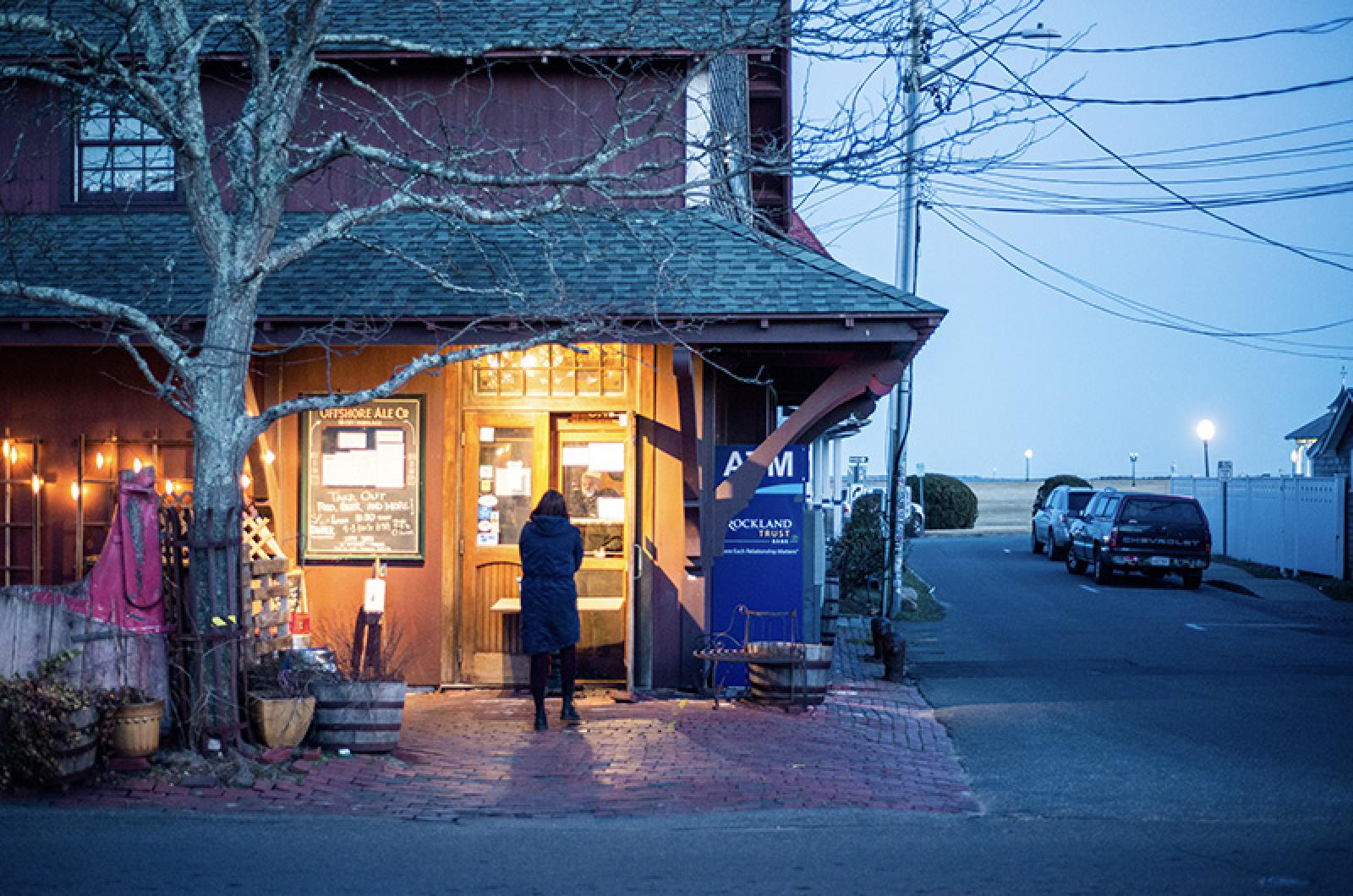
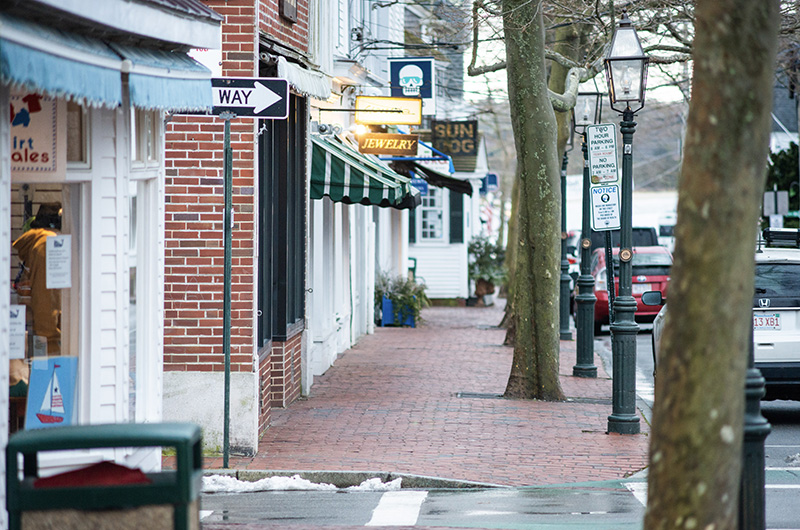
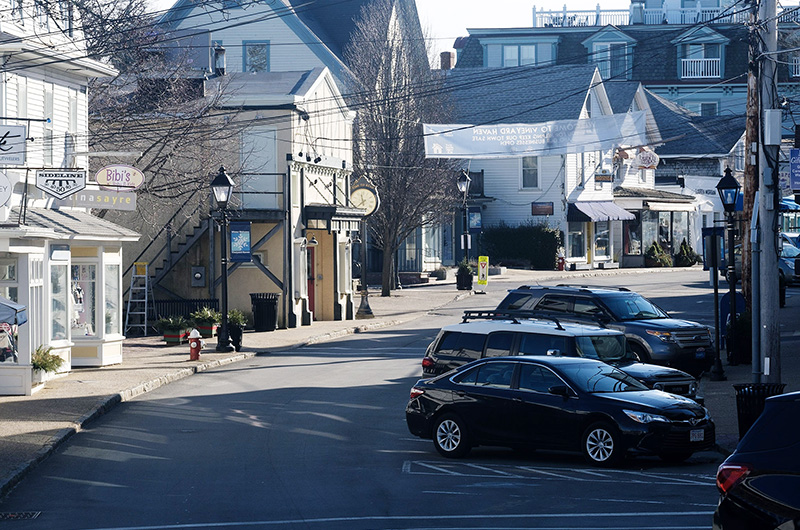
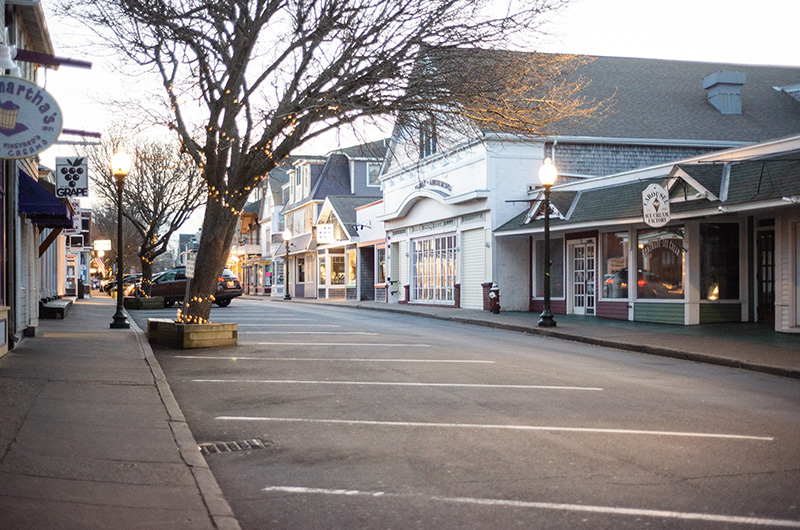

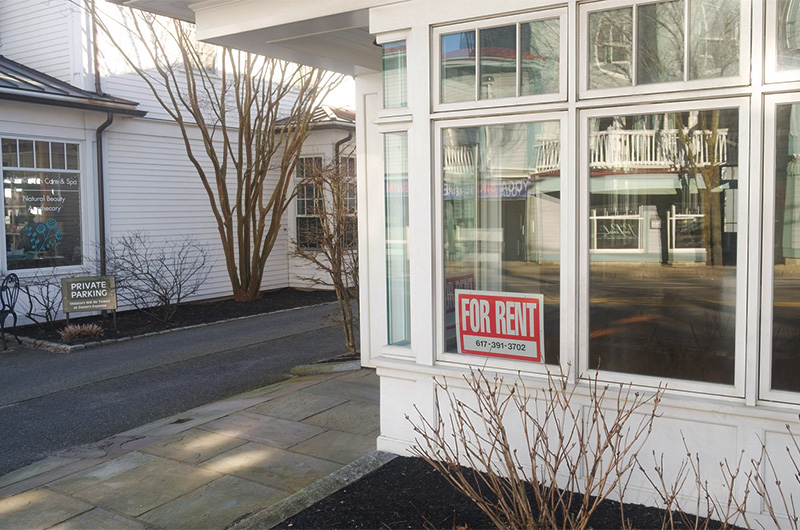





Comments (23)
Comments
Comment policy »